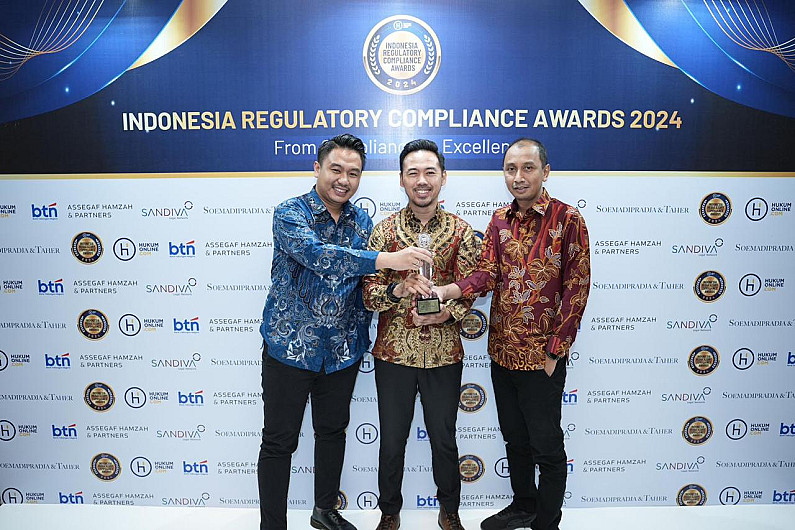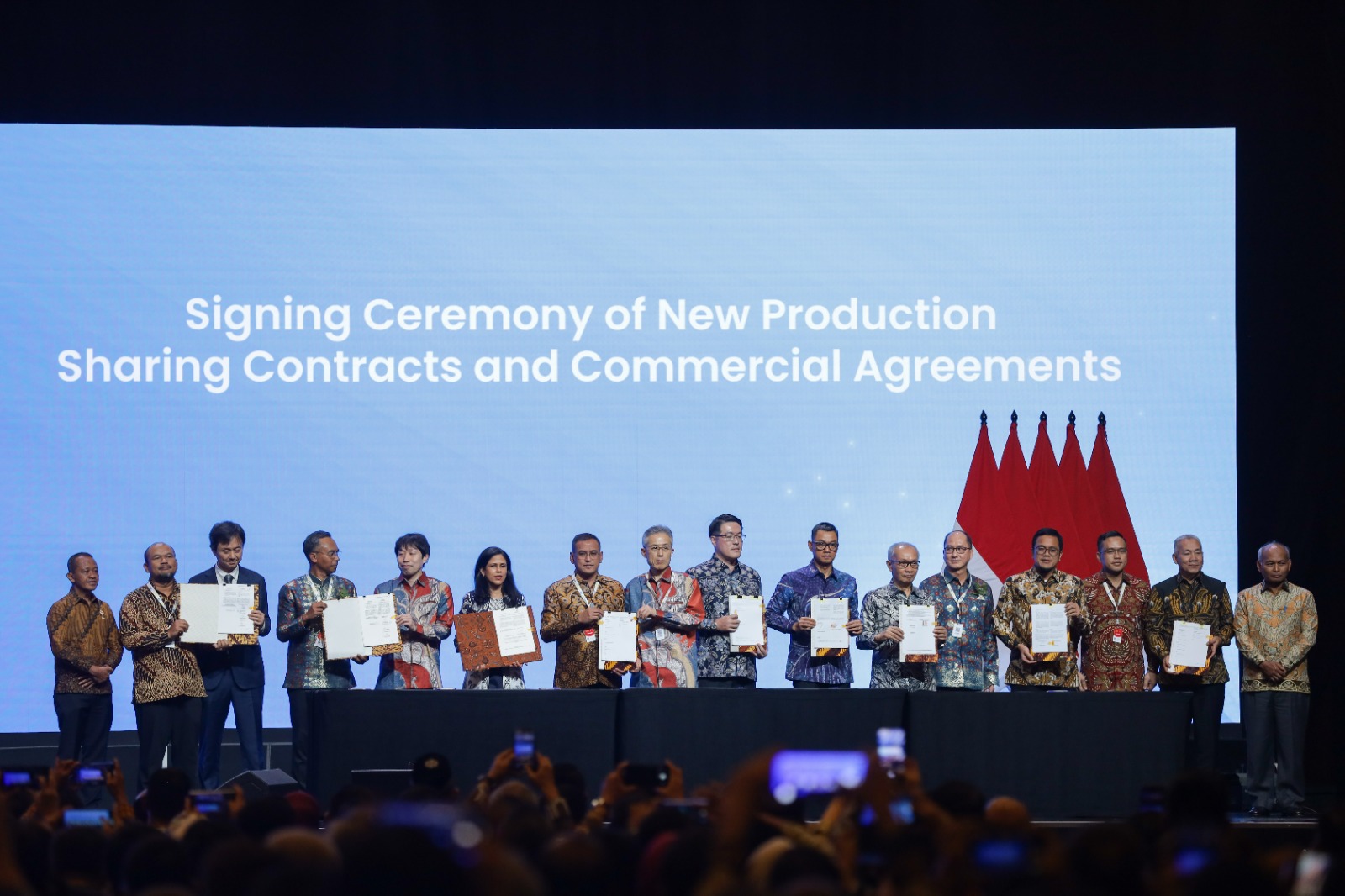Komitmen Jaga Tata Kelola Bisnis yang Baik dan Berintegritas Pupuk Indonesia Raih Penghargaan Indonesia Regulatory Compliance Awards 2024

Jakarta, 5 Juni 2024 – Berkah konsistensi dan komitmen menjaga tata kelola bisnis yang baik dan berintegrasi, PT Pupuk Indonesia (Persero) berhasil meraih penghargaan Indonesia Regulatory Compliance Awards (IRCA) 2024 dengan predikat gold. Penghargaan ini diberikan oleh Hukumonline kepada perusahaan dalam konteks kepatuhan hukum yang berlaku di Indonesia.
“Dalam menjalankan kegiatan usahanya, Pupuk Indonesia Grup terus berkomitmen menciptakan keberlanjutan yang didukung oleh hukum terhadap peraturan perundang-undangan merupakan salah satu landasan utama dalam menjalankan bisnis. Pupuk Indonesia tentunya mengucapkan banyak terima kasih kepada pihak penyelenggara atas penghargaan yang telah diberikan,” demikian ungkap SVP Hukum Pupuk Indonesia, Benediktus All.
Sebagai BUMN yang mendukung terwujudnya ketahanan pangan nasional, Pupuk Indonesia menilai kepatuhan hukum menjadi bagian penting yang harus dipegang teguh Perusahaan. Hal ini menyusul regulasi yang terus berkembang dan berubah, kepatuhan hukum lebih dari sekadar kewajiban tetapi tanggung jawab moral dan etika yang harus dijunjung tinggi.
Kompleksitas dan dinamika regulasi menuntut pelaku usaha terus beradaptasi untuk memastikan tata kelola bisnis berjalan baik dan berintegritas sesuai dengan regulasi yang ada. Apalagi konteks kepatuhan hukum ini tidak seberapa patuh Perusahaan atas kewajiban hukumnya, akan tetapi lebih kepada strategi, komitmen, inovasi, dan sebagainya.
”Sekali lagi kami ucapkan terima kasih atas penghargaan dan juga dukungan seluruh direksi Pupuk Indonesia, manajemen, dan seluruh insan Pupuk Indonesia Grup,” kata Benediktus.
Untuk pertama kalinya, Hukumonline menggelar ajang penganugerahan penghargaan dalam praktik kepatuhan hukum perusahaan di Indonesia. Inovasi ini diwujudkan dalam bentuk Indonesia Regulatory Compliance Awards (IRCA) 2024 sebagai medium pemeringkatan perusahaan tentang strategi kepatuhan hukum terhadap peraturan perundang-undangan di Indonesia.
“Indonesia Regulatory Compliance Awards adalah event penghargaan yang diberikan oleh Hukumonline kepada perusahaan dalam konteks kepatuhan hukum yang berlaku di Indonesia. Konteks kepatuhan hukum ini tidak terkait seberapa patuh perusahaan atas kewajiban hukumnya, tetapi lebih kepada strategi, komitmen, inovasi, dan sebagainya,” ujar Research & Awards Manager Hukumonline Katon Baskoro.
Katon melanjutkan pemeringkatan dilakukan dalam bentuk klasifikasi perusahaan berdasarkan pada karakteristiknya masing-masing. Karakteristik perusahaan ditunjukkan melalui sektor industri, kompleksitas bisnis, dan tingkat regulasi perusahaan
Pemeringkatan menggunakan data primer yang diberikan secara langsung oleh perusahaan dalam bentuk deskripsi mengenai tiga parameter. Pertama, strategi kepatuhan yang diimplementasikan oleh perusahaan. Kedua, performa manajemen atau pengelolaan organisasi oleh pemimpin dalam rangka menjalankan kewajiban kepatuhan hukum. Ketiga, kontrol kepatuhan hukum oleh perusahaan induk terhadap anak perusahaan.
Terdapat parameter penilaian untuk mengelaborasi informasi matriks penilaian di IRCA 2024. Penilaian akan dilakukan berdasarkan kompleksitas pengaturan yang berbeda-beda. Parameter validasinya adalah Klasifikasi Baku Lapangan Usaha Indonesia (KBLI) yang dijalani tiap perusahaan.
Pertama, penilaian performa manajerial oleh pimpinan yang bertanggung jawab pada kepatuhan hukum di perusahaan dalam rangka membentuk manajemen sistem kepatuhan yang unggul. Penilaian ini mencakup soal pengelolaan sumber daya manusia dalam upaya kepatuhan hukum, mekanisme evaluasi dan monitor kerja dalam upaya kepatuhan hukum, upaya membangun kolaborasi dan merawat integrasi, dan upaya dalam menanggapi ketidakpatuhan yang terjadi pada internal perusahaan.
Kedua, parameter strategi yang dilakukan oleh perusahaan dalam rangka menjaga dan meningkatkan tingkat kepatuhan terhadap berbagai peraturan yang dikeluarkan oleh pemerintah dan lembaga di tingkat pusat dan daerah.
Hal di atas mencakup proses bisnis di perusahaan, strategi sosialisasi internal tentang peraturan, kontrol atas kepatuhan peraturan setiap divisi di perusahaan, kebijakan serta mekanisme pembuatan kebijakan internal yang mendukung kepatuhan, proses evaluasi dan pelaporan atas kinerja kepatuhan, dan inovasi atau teknologi yang digunakan dalam rangka kepatuhan peraturan.
Ketiga, strategi kontrol di perusahaan (sebagai perusahaan induk) dalam rangka pelaksanaan kepatuhan hukum yang diterbitkan oleh pemerintah dan lembaga pada tingkat pusat dan daerah di anak perusahaan.







